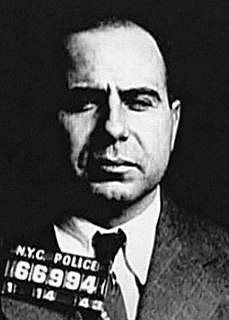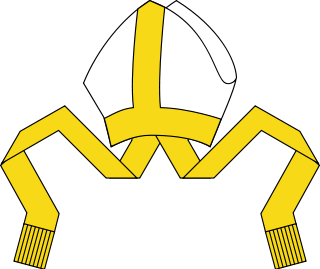
Moses was a prophet according to the teachings of the Abrahamic religions. Scholarly consensus sees Moses as a legendary figure and not a historical person, while retaining the possibility that a Moses-like figure existed.
Zips is a slang term often used as a derogatory slur by Italian American and Sicilian American mobsters in reference to newer immigrant Sicilian and Italian mafiosi. The name is said to have originated from mobsters' inability to understand the faster-speaking Sicilian dialects, which appeared to "zip" by. Other theories include pejorative uses such as Sicilians' preference for silent, homemade zip guns. According to still another theory, the term is a contraction of the Sicilian slang term for "hicks" or "primitives." The older Sicilian mafiosi of the pre-Prohibition era known as "Mustache Petes" were also referred to as "zips".
Yom Tov ben Moshe Tzahalon,, also known as the Maharitatz,, was a student of Moses di Trani and Moshe Alshich, and published a collection of responsa.

Carmine Galante was an American mobster and boss of the Bonanno crime family. Galante was rarely seen without a cigar, leading to the nickname "The Cigar" and "Lilo".
Galante is a surname. Notable people with the surname include:

Eliyahu de Vidas was a 16th-century rabbi in Ottoman Palestine. He was primarily a disciple of Rabbis Moses ben Jacob Cordovero and also Isaac Luria. De Vidas is known for his expertise in the Kabbalah. He wrote Reshit Chochmah, or "The Beginning of Wisdom," a pietistic work that is still widely studied by Orthodox Jews today. Just as his teacher Rabbi Moses Cordovero created an ethical work according to kabbalistic principles in his Tomer Devorah, Rabbi de Vidas created an even more expansive work on the spiritual life with his Reishit Chochmah. This magnum opus is largely based on the Zohar, but also reflects a wide range of traditional sources. The author lived in Safed and Hebron, and was one of a group of prominent kabbalists living in Hebron during the late 16th and early 17th-century.

Hayyim ben Joseph Vital was a rabbi in Safed and the foremost disciple of Isaac Luria. He recorded much of his master's teachings. After Vital's death his writings spread having a "powerful impact on various circles throughout the Jewish world."

Marie-Galante is one of the islands that form Guadeloupe, an overseas department of France. Marie-Galante has a land area of 170.5 km2. It had 11,528 inhabitants at the start of 2013, with a population density of 67.6/km2 (175/sq mi).

Joseph Anthony Galante was an American prelate of the Roman Catholic Church who served as Bishop of Camden, New Jersey, from 2004 to 2013. He held several positions as a bishop in Texas from 1992 to 2004, after serving in the Roman Curia as Undersecretary of the Congregation for Religious from 1986 to 1992.

Sala Galante Burton was a Polish-born American politician who served as a United States Representative from California from 1983 until her death from colon cancer in Washington, D.C., in 1987.
James Galante is a convicted felon and associate of the Genovese crime family, owner of the defunct Danbury Trashers minor league hockey team and also a racecar team fielding cars for Ted Christopher, and ex-CEO of Automated Waste Disposal (AWD), a company which holds waste disposal contracts for most of western Connecticut and Westchester and Putnam counties in New York. Despite this, he has been known to be a community-minded philanthropist, and his donations have included a new football stadium at New Fairfield High School and a pediatric emergency department at Danbury Hospital.
Cesare "The Tall Guy" Bonventre was a Sicilian mobster and caporegime for the New York City Bonanno crime family.

Rabbi Hezekiah da Silva (1659–1698) was a Jewish author born in Livorno, Grand Duchy of Tuscany. He was the son-in-law of the dayan Mordechai Rafael Malachi.
Moses Hagiz was a Talmudic scholar, rabbi, kabbalist, and writer born in Jerusalem during the time of the Old Yishuv. He was also one of the most prominent and influential Jewish leaders in 17th-century Amsterdam. During Hagiz's lifetime, there was an overall decline in rabbinic authority which was the result of migration and assimilation, and Hagiz devoted his career to restoring rabbinic authority. His most prominent talent was as a polemicist, and he campaigned ceaselessly against Jewish heresy in an attempt to unify the rabbinate.
Moshe ben Mordechai Galante(Hebrew: משה בן מרדכי גאלאנטי), was a 16th-century rabbi. He was a disciple of Joseph Caro, and was ordained by Caro when he was only twenty-two years old. He wrote sermons for a wedding, for Passover, and for a thanksgiving service, printed with the younger Obadiah Bertinoro's commentary on the Book of Esther. He also wrote Miftaḥ ha-Zohar, an index of Biblical passages found in the Zohar and additions from old manuscripts, Kehillat Ya'aḳob, a cabalistic commentary on Ecclesiastes, and responsa with additions by his son Jedidiah Galante.
Moses Galante was chief rabbi of Damascus during the late 18th century and early 19th century.
Abraham ben Mordecai Galante was an Italian kabbalist born in Rome at the beginning of the 16th century. Abraham, like his father Mordecai and his brother Moses of Safed, is represented by his contemporaries as a man of high character who led a holy life. Being wealthy, he erected a splendid mausoleum over the tomb of Simon ben Yoḥai at Meron, which is still admired.
Moshe ben Yonatan Galante, grandson of Moshe Galante, was a 17th-century rabbi at Jerusalem. He served as the first Rishon Le'Zion and was called Magen (מגן) with reference to the initials of his name. Hezekiah da Silva was among his disciples.
Galante was a Jewish family which flourished at the beginning of the 16th century in Rome, and the head of which, Mordecai, was a Spanish exile of the Angel family. His courteous manners won for him from the Roman nobles the surname "Galantuomo" (gentleman), a name which the family retained. About this time the family settled in Palestine, where it produced authors and other celebrities, among them the following:

Marie Galante is a 1934 American film directed by Henry King, starring Spencer Tracy, and adapted from a French novel by Jacques Deval. Later in the same year the novel was adapted into a French musical entitled Marie Galante, with book and lyrics by Jacques Deval and music by Kurt Weill.








